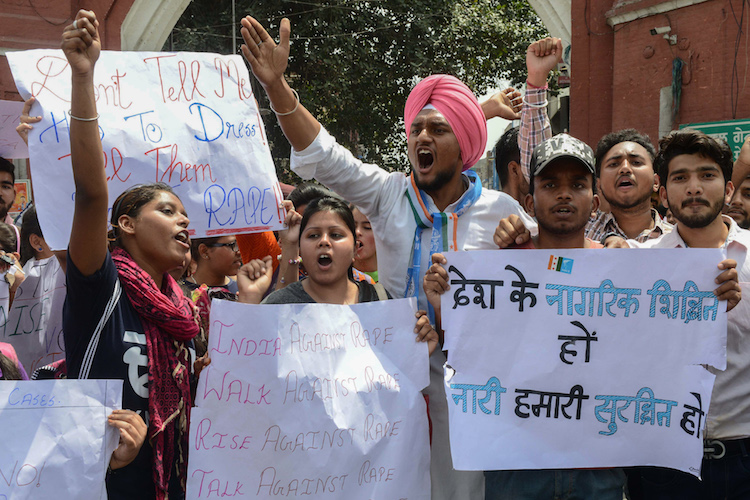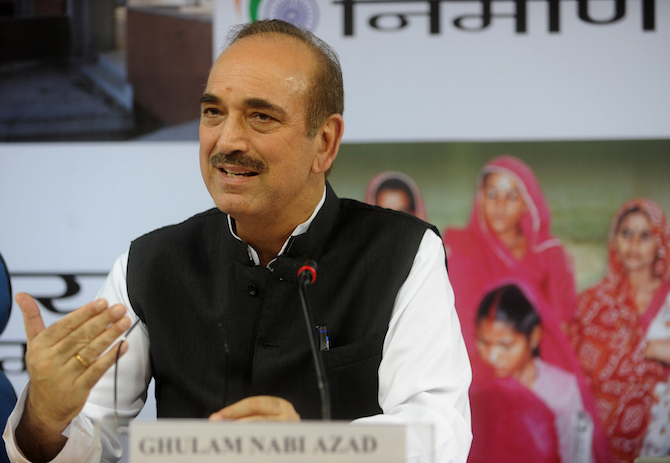BJP accused of using the judiciary for its own political purposes after a string of suspicious court acquittals

Indian students protest in Amritsar on April 19 calling for justice following the rape and murder of an 8-year-old girl in Jammu and Kashmir. (Photo by Narinder Nanu/AFP)
Umar Manzoor Shah, Srinagar, India April 30, 2018
For the first time since the British left and India became a free country, its judicial system is being questioned, with opposition and civil society groups accusing the pro-Hindu ruling Bharatiya Janata Party (BJP) of using the judiciary for its own political purposes.
On April 21, seven opposition parties led by Congress met Vice-President Muppavarapu Venkaiah Naidu and handed him a notice to impeach Chief Justice Dipak Misra, accusing him of misbehavior and abuse of authority.
“We have mentioned in our notice how the chief justice is choosing to send sensitive matters to particular benches by misusing his authority as master of the roster with the likely intent to influence the outcome,” Congress leader Ghulam Nabi Azad told reporters in New Delhi.
Rights activist Ravi Nair says the judiciary is facing a serious threat. “Never in the past has it been tested on its loyalty to the Indian constitution and its adherence to due process of law as it is being done now,” said the executive director of the South Asia Human Rights Documentation Centre.
Rights groups and opposition politicians claim the ruling BJP, led by Prime Minister Narendra Modi, influences courts for favorable judgments in cases where BJP members and Hindu groups are accused.
Nair said in several cases where Hindus were accused of cow-related lynchings of Muslims “courts have failed to prosecute the killers speedily.”
Violence linked with cows, a revered animal in Hinduism, has claimed at least 25 lives since 2010, and 21 of them were Muslims, according to a recent report by IndiaSpend, a data website. Most were based on rumors of them transporting or storing beef.
Judges trigger crisis
The crisis in the judiciary intensified in January when four senior Supreme Court judges went public to accuse the chief justice of partisan conduct.
The immediate trigger for the rebellion was a case related to the death of B.H. Loya, a Mumbai-based judge who reportedly died of a heart attack in 2014. Loya had been presiding over the case of Sohrabuddin Sheikh, who was killed in the custody of Gujarat police.
One of the accused in the case was Amit Shah, the current BJP president, who was home minister of Gujarat in 2005 when Sheikh was shot dead. Shah was discharged a few days after the judge’s death.
On April 19, a bench headed by Chief Justice Misra dismissed a petition seeking an investigation into Loya’s death. The judgment said his death was natural and such petitions cast suspicion on the judiciary.
In another sensitive case, a special court on April 16 acquitted five Hindu activists of bombing Makkah Masjid mosque in Hyderabad city, saying the National Investigation Agency (NIA) had failed to establish their role in the attack.
Nine people were killed in the 2007 blast. The case was initially probed by local police but was handed over in 2010 to the Central Bureau of Investigation, which arrested Hindu monk Swami Aseemanand and linked the case to right-wing Hindu activists. The case was later transferred to the NIA.
The case raised suspicion when judge K. Ravinder Reddy resigned just hours after the verdict citing personal reasons.

Congress leader Ghulam Nabi Azad has accused Chief Justice Dipak Misra of abusing his authority. (Photo by AFP)
Last bastion falling?
Ever since the BJP came to power in 2014, the judiciary and other democratic institutions started to lose credibility, says Irfan Nazir, a political activist based in Jammu.
“There are cow vigilantes killing people in the name of religion. When an 8-year-old Muslim girl was raped and killed in Jammu, Hindu fanatic groups even stopped the police from filing a charge sheet in court because the accused was a Hindu. This is the worst period for the country,” Irfan told ucanews.com.
The judiciary is the last resort for a common man to seek justice but the BJP seems to be in control, he said. “The prime accused in the Makkah Masjid case have been acquitted … the probe agencies prepared the ground for the acquittal of the accused,” said Irfan.
Ashok Singh, a political commentator in New Delhi, says it is the worst time for the Indian judiciary and parliament since Indira Gandhi declared a state of emergency in 1971.
“On the one hand, the judiciary’s credibility is under attack. The Supreme Court stands divided with senior judges venting their disappointment over the conduct of the chief justice in public. On the other hand, the government — Modi in particular — has shut down all channels of communications with the opposition, which has resulted in the paralysis of parliament,” Singh said.
The Modi government appears unconcerned and unwilling to work to restore the credibility of parliament and the judiciary as the highest institutions, he said.
The latest acquittals follow a long pattern established by Modi in Gujarat when thousands of accused people were let off after riots in 2002, says Zafrul islam Khan, chairman of the Delhi Minorities Commission.
Khan told ucanews.com that money, muscle, threats, coercion, murder and bribes have been used freely outside courts, while public prosecutors and government lawyers sympathetic to Hindu groups were employed in courts after the 2002 riots.
“Judges have been changed frequently, as testified by Babu Bajrangi [leader of the Gujarat wing of a Hindu nationalist group] in a sting operation, to clinch the required results. The same pattern continued, though on a larger scale, after Modi came to power,” Khan said.
“The Makkah Masjid verdict is only part of the chain. Many more will be let off in the coming months and years.”



0 Comments
LEAVE A COMMENT
Your email address will not be published